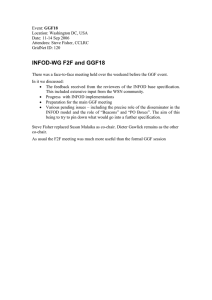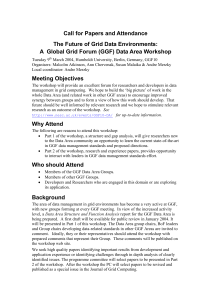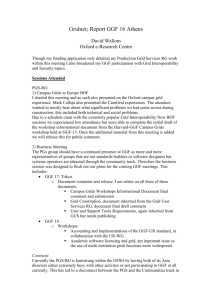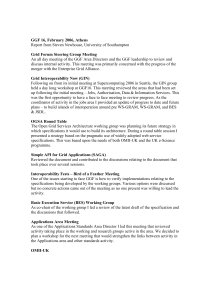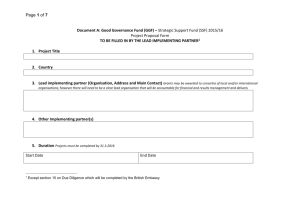– January 2006 GFSG F2F
advertisement
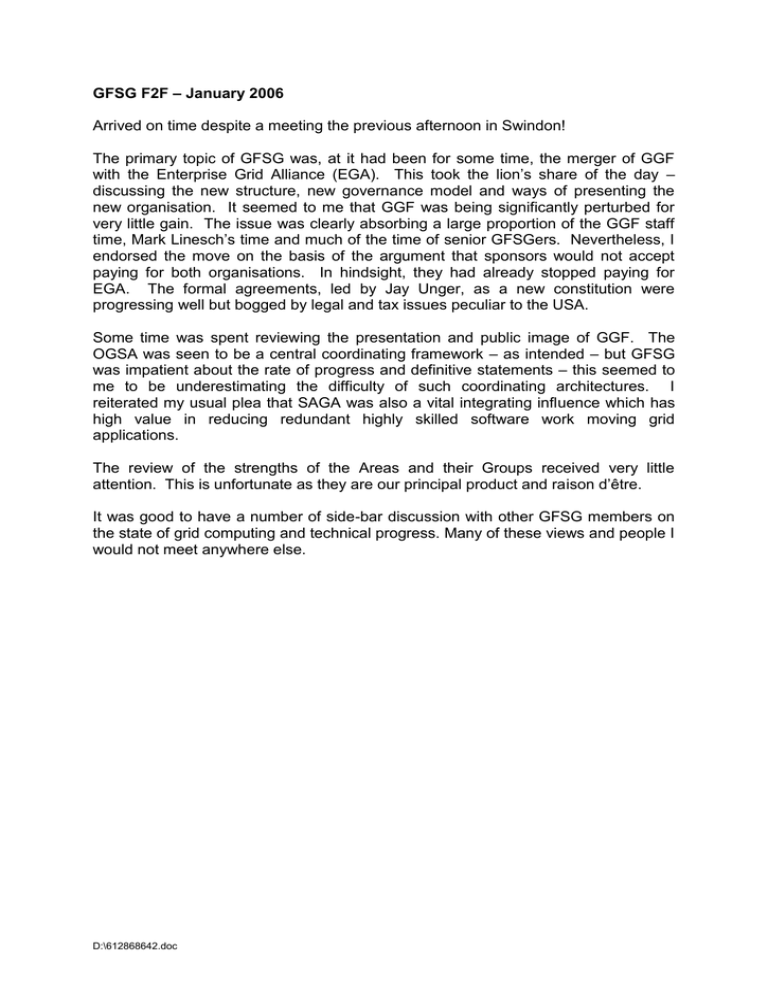
GFSG F2F – January 2006 Arrived on time despite a meeting the previous afternoon in Swindon! The primary topic of GFSG was, at it had been for some time, the merger of GGF with the Enterprise Grid Alliance (EGA). This took the lion’s share of the day – discussing the new structure, new governance model and ways of presenting the new organisation. It seemed to me that GGF was being significantly perturbed for very little gain. The issue was clearly absorbing a large proportion of the GGF staff time, Mark Linesch’s time and much of the time of senior GFSGers. Nevertheless, I endorsed the move on the basis of the argument that sponsors would not accept paying for both organisations. In hindsight, they had already stopped paying for EGA. The formal agreements, led by Jay Unger, as a new constitution were progressing well but bogged by legal and tax issues peculiar to the USA. Some time was spent reviewing the presentation and public image of GGF. The OGSA was seen to be a central coordinating framework – as intended – but GFSG was impatient about the rate of progress and definitive statements – this seemed to me to be underestimating the difficulty of such coordinating architectures. I reiterated my usual plea that SAGA was also a vital integrating influence which has high value in reducing redundant highly skilled software work moving grid applications. The review of the strengths of the Areas and their Groups received very little attention. This is unfortunate as they are our principal product and raison d’être. It was good to have a number of side-bar discussion with other GFSG members on the state of grid computing and technical progress. Many of these views and people I would not meet anywhere else. D:\612868642.doc GFSG & GGF16 – Athens The GFSG meeting was well attended and followed on from the recent F”F in San Francisco so that the topics and distribution of time was much as described for the previous meetings. These same topics had dominated the weekly telcons for several months and it was very clear that this was inhibiting attention to standards and perhaps to community development. A review of the topics to be covered in the opening and town meeting had to manage the flow of publicity as well as sustaining the volunteer commitment. This is a difficult balance act, particularly when one also seeks to avoid ruffling any sponsors. I now write my Data Area Director view of progress though I could not get to every DA WG session. Being in Europe, the OGF sessions were well attended and it was pleasing to see plenty of work in the data area. This INFO D WG seems to be a little esoteric, more like a research group at times, but it is beginning to limit its scope and develop focus with planned applications. There is some continuation between the generic work on naming that is emerging as a requirement in OGSA and the particular melding of naming with file management in the grid file systems (GFS) WG. The DAIS WG is making good progress on wrapping up its initial three proposals and developing a plan for interoperability testing. Steve Pickles was particularly helpful in advising the DAIS WG on hour to address this task. It became clear that this was pioneering new territory for GGF. It is frustrating not to have systematic work on distributed data management including replication and caching, but it was never been possible to get the relevant parties to work together. The OGSA Data WG led by Dave Berry is, however, establishing a vision of requirements and a framework as to how these may be met. The GridFTP story is complete and the standard is widely used, but the necessary experience report is not forthcoming to turn it from recommendation to a standard. The work on grid storage management which is the umbrella for standards shaping the Storage Resource manager (SRM) widely used by experimental particle physics, is very active but not particularly concerned with delivering a final document yet. Progress on DFDC is slow, which is a pity as it is a very important approach to efficient, interoperable data access. The generic requirement of a data movement request abstraction is beginning to be recognised by both the GSM and GridFTP groups. Writing now in my role as initiator of work on training and education; David Fergusson and I had organised a workshop and BoF on grid education, partially motivated by the imminent start of the FP6 ICEAGE project. The workshop and BoF were very well attended with much energy and promise of commitment. We therefore resolved to propose the formation of a Training and Education group. I have managed to get this as one of the named goals of the new organisation. I used all of the opportunities available, including an announcement at the Town Hall meeting to advertise ISSGC’06, which is endorsed by GGF, who provide administrative help through Ann Colins. 2 Overall a successful and effective GGF meeting with much going on throughout the entire day, every day, that is driving forward the grid agenda on many fronts. It was a little surprising to experience a dust storm from the Sahara while in Athens. 3 GGF17 – Tokyo The public transport adventure of getting to the GFSG proved surprisingly easy despite the profusion of lines and platforms in this immense and complicated network; thanks to punctual schedules, clear English notices and, above all, Satoshi Matsuoko’s careful instructions and meticulous preparation. He was a wonderful host throughout the event. The GFSG was, once again, dominated by the practicalities of the transition to the merged OGF. There is a considerable challenge keeping arrangements developing without going pubic. The Enterprise community still seems to be misguided in their belief that GGF, a standards organisation, can do market building. This is inheriting the worst features of EGA and it does not deliver a programme that will convince anybody, as the unconvinced would not attend GGF/OGF meetings – another misguided distraction. Worse, they have the notion that they can gather requirements that the standards groups will implement. There are two intractable problems with this. 1. The discussions are invariably at a generic level which fails to capture the detail needed for standards and usually concerns the composed functions that depend on the integration of many standards. 2. The work in standards working groups has usually started with collection, collation and analysis of requirements, and they then have a momentum that will not be diverted, and should not be, until the standard is produced. These are symptoms of three challenges for GGF (or any similar SDO). 1. It is very hard to recruit and sustain the efforts of technical experts relevant to a standard. 2. It is very hard to steer the composition of volunteers to do anything other than the work which they originally came to GGF to undertake. Usually this is one or two specific standards that warrant the allocation of their time in the judgement of themselves and their employers. 3. Standards require development of consensus, documents that describe accurately that consensus, and documentation through independent implementation that these standards work. Those not engaged in standards development invariably grow impatient and denigrate the effort because they do not appreciate the need for this elapsed time. So, for it to be a benefit, the formation of OGF must address these issues. In particular, it must generate effort from industry that includes experts working on standards. If industry requires standards, it must be prepared to invest in them. Though there are promising sings that Microsoft will invest in the OGSA execution model HPC profile, there is no general commitment. Paul Strang is clearly a very helpful, powerful intellect with commitment and deep experience, but there is a very real dearth of prospects in the data area despite many data companies being in the EGA. 4 Switching to sessions, the DAIS-WG meetings and the OGSA-DAI workshop are a great success as the very strong local community, led by Isao Kojima, is very active. In particular, they have well developed experience with RDF extensions to OGSADAI in order to hold biomedical semantic data. This has led to a commitment to develop an RDF version of the WS-DAI specification. Also delighted to hear that OGSA-DAI is a key component of NAREGI and in production use for their grid information system. Looking at the Data Area as a whole, a Area Director’s view, this was a most productive meeting. Though the number of people present was reduced, the number of active and effective standards workers was not – and they were not distracted by explaining things to people who only show up once. (There does seem to be some case for constraining participation, at least in standards formulation and drafting, to those who have read the WG’s documents and informed themselves of the relevant background.) The INFO-D WG was particularly productive after a pre-meeting. The BYTE-IO WG on requirement sparked by DAIS and OGSA-DAI, was making spectacular progress. Neil Chue Hong and his colleagues from Virginia are to be congratulated. Overall, all of the standards areas seemed very productive – possibly a demonstration of ‘Mythical Man Month’ effects. The talk on OGSA by Hiro Hishimoto was excellent and made it exceptionally clear why an overwhelming framework in which to build standards is reliable. Though it has rapidly advancing profiles (specific realisations), there is still a lack of realism in the impatience about progress. David Snelling clearly understands and balances the issues, but Mark Linesch is keen to pick just one ‘silver bullet’ to demonstrate GGF’s value. I still feel much more should be made of APIs, particularly the work of SAGA WG as immediate gains can be made in productivity and portability through stable APIs. The putative group on Education and Training held another BoF, with much energy and enthusiasm. We (mainly David Fergusson, Kathryn Cassidy and myself) thrashed out a proposed programme of work on charter. A bit ambitious perhaps. The contributions from Rüdiger Berlich were significant. Reagan Moore gave an interesting talk on his plans for iRODs, but it connected very little with standards. A re-implemented SRB with rules/computation that can be triggered by data actions. Microsoft demonstrated a multi-site conference system. It looked easy to install and use but did not interwork with Access Grid. Furthermore, it would depend on the same difficult to tune Gentner echo cancelling and poorly supported multicast standards. A report on the meeting could not be concluded without a comment on the wonderful building in which the event was held: a remarkable open inverted hull shape on an enormous scale, with shelves of rooms around the sides connected by inner airy 5 walkways and dramatic transverse level-changing bridges. We only used a small fraction of the space which had its own metro station in the basement. 6 GGF 18 – Washington This is my last GGF/OGF where I have to arrive on the Saturday for Sunday’s GFSG as I have decided that, as I am on the OGF Board, I cannot also be on the GFSG. So will take a few moments to review the experience of being on GFSG. Initially, it was a very valuable activity but time-consuming: three one-day face-to-face meetings (i.e. before each GGF); attending all of each GGF, with side-bar meetings approximately 7.00am to 9.00pm each day; a two-day face-to-face in January; a half-day face-to-face at Super Computing; weekly two-hour telcons; reading reports; and communicating with group chairs. Its value was high: providing interesting networking with field-leaders as well as other Area Directors, the GGF office team and the GGF leaders; supporting decisions on managing groups; imposing quality controls on the GGF publications; planning the GGF events;, and addressing sustainability and publicity. The dominance of this merger and the business it generated greatly reduced the time invested in standards, even though the time and calls, and at face-to-face meetings, was officially partitioned to preserve the division of attention. Extra calls and face-to-face meetings were undertaken to address pressing standards issues, such as priorities, integration and gap analysis, and document processing. After discounting this there are still two major challenges, which remain insuperable. 1. Although this is a ‘Steering Group’, it finds it very hard to steer. a) b) c) The standards (and other groups) work on what they care about (or their employers want) and it is hard to get anything else done – so group steering is mainly limited to persuasion to achieve minor changes or termination if the group falls inactive. Blocking publication of a report makes a group reconsider, but this has to be used sparingly. Where requirements are recognised, it is not necessarily possible to persuade people to start a group to address them. After many years of trying to influence the form of GGF/OGF events, it is clear that they are not shaped by GFSG and controlled by their programme committee. The exigencies of satisfying sponsors, the diverting pull of publicity, the varying ideas on Enterprise and eScience, and the president’s need to commit during crucial meetings, combine to overwhelm any principled plan. 7 2. The continuing challenge of obtaining sufficient income often leads the organisation along contingent paths or means that there are not the resources to achieve the goals. The office staff, led by Steve Crumb, work wonders but they are not magicians. I would still recommend that UK e-Science has one or two active members of GFSG – for example Dave De Roure does a vital job at the interface with W3C that is useful to UK e-Science – but we should in the future only have a modest presence. We have had a substantial proportion of the Area Director chairs in the past. I am sorry to demit the role of Data Area Director and will miss the interactions with David Martin as my co-director, and the work with the individual working groups. The atmosphere at the event was frenetic because of the juxtaposition of GridWorld. there was no evidence of benefits, and the WG sessions were depleted of effort compared with their normal attendance and energy. The data area continues to push effectively on many fronts, including the following. DA15, with documents in comment and interoperability testing, a progressive hand-over of chairs (Dave Pearson and Norman Paton have done an excellent job). The RDF story is developing with significant inputs from Isao Kojima and the ONTOGRID group in Spain. The GFS group progresses well, but there is emerging contention over the issues of standards for naming, as the OGSA-WG has a vision of a generic naming standard and GFS is trying to accommodate the existing behaviour of file systems. This was eventually resolved. The work on storage systems GSM, essentially a standard for SRM progresses slowly on paper but well in practice with >5 implementation efforts under way. It is unclear how this relates to other storage activities, such as SRM and SNIA standards, but it does relate well to GridFTP. GridFTP is productive; that is, it has yielded a standard which is in daily highrelevance production use, including by the above SRM stores. This is a success for GGF, which is well hidden because the Grid FTP community has not written an experience report to transform the ‘standard’ from a ‘standard proposal’ to a standard. The above two communities combine in a group DMI, defining a Data Movement Interface, for requesting a bulk movement of data. this is much needed. They are focusing on file movement. The OGSA-data group had also identified the need for DMI. There is not much sign of DFDL progress, which is a great pity. Byte-IO has demonstrable success and is still fast moving. There is still no prospect of forming an effective group to look at distributed data replication though this is clearly important and there are several operational implementations. A welcome first at this OGF is the active engagement of the Open Geospatial Consortium (OGC) standards group. this is very significant for the standards area as about 80% of data has some geospatial element. The OGSA-DAI team, under the aegis of OMII-UK, had a very successful tutorial workshop and user group meeting. 8 The Education and Training Community Group (ET-CG) under the e-Science OGF banner, received its charter approval just in time for GGF18. It held its first two sessions, setting out its programme of work and organising its several co-chairs. There was strong input from Wolfgang Gentsch of D-Grid and our colleagues from Karlsruhe, and significant interest from the USA for the first session. The second session was poorly attended, a common feature of this GGF. Most of the detailed planning for ET-CG had been done by David Fergusson and myself, and we chaired the sessions. Many thanks are due to Joel Replogle for setting up ET-CG in about 24 hours, and to Kathryn Cassidy for a burst of secretarial energy recording our meetings and populating our ‘wiki’. The formation and announcement of OGF is by now a non-event for GFSG members as we have talked about it ad nauseum for over a year. The big questions is whether it will bring in industrial technical commitment to work on standards and experience-led best practice. Paul Strong is an immense asset, gained through the merger. This was very evident at the Board as well as when he spoke in plenaries and session. I do not have significant other evidence of gain in this area, but I have a limited view and there is time. The other big question is whether it will help sustainability and income. The software developer track proposal by Charlie Catlett is a good one for gaining engagement and community strength. The OGSA progresses well, particularly on the Basic Execution Service (BES) front, and there is growing interest from Microsoft in developing a BES HPC profile. Overall, this event was a mixed performance, some very good sessions but others where logistics and rival activities limited expert engagement severely. 9
